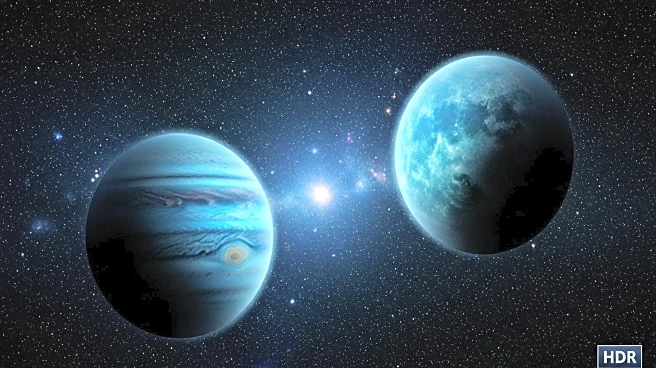What's Happening?
Recent research suggests that Uranus and Neptune, traditionally classified as 'ice giants,' may actually be 'rocky giants.' This new perspective arises from a study that used random models to analyze the planets' interiors, comparing them to observational data. The study found that the rock-to-water ratio in Uranus and Neptune varies widely, indicating that their interiors may contain more rock than previously thought. This challenges the long-held belief that these planets are primarily composed of water, ammonia, and other ices. The lack of direct data from dedicated missions to these planets has led researchers to rely on indirect clues, such as magnetic fields and surface atmosphere features, to understand their composition.
Why It's Important?
Reclassifying Uranus and Neptune as 'rocky giants' could have significant implications for our understanding of solar system formation. It suggests that the outer solar system may contain more rocky material than previously believed, potentially altering models of planetary formation and migration. This new classification could also impact future space missions and research priorities, as scientists may need to reconsider the composition and dynamics of these distant planets. Understanding the true nature of Uranus and Neptune is crucial for comprehending the broader processes that shaped the solar system.
What's Next?
To resolve the uncertainties surrounding Uranus and Neptune's composition, a dedicated mission to these planets is necessary. High-quality data from an orbiter could provide definitive answers about their interiors and help refine models of solar system formation. Such a mission would require significant investment and international collaboration, given the technical challenges and costs involved. In the meantime, researchers will continue to analyze existing data and develop new models to better understand these enigmatic planets.
Beyond the Headlines
The study highlights the limitations of current planetary science, where indirect evidence often guides hypotheses due to the lack of direct exploration. It underscores the need for continued investment in space exploration and technology to gather more accurate data. The reclassification of Uranus and Neptune also raises questions about the potential for other planets in the solar system to have unexpected compositions, prompting further investigation into the diversity of planetary types.








